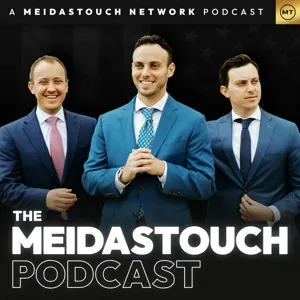Podcast Summary
Former President Trump's 2024 Immigration Rhetoric: Darker and More Autocratic: Trump's 2024 immigration campaign language includes darker, authoritarian rhetoric, with accusations of immigrants being a threat, building the wall, expanding the Muslim travel ban, and poisoning the blood.
During his 2024 presidential campaign, former President Donald Trump's rhetoric on immigration has become increasingly darker and autocratic, going beyond the vitriolic language used during his 2016 campaign. He has continued to use his infamous "snake" poem, but has also introduced new phrases like "poisoning the blood," which experts and scholars have compared to the language used by former strongmen. Trump's speeches have included accusations that immigrants are a threat to the country, and he has advocated for building the wall, expanding the Muslim travel ban, and other restrictive immigration policies. This language, which some see as reminiscent of authoritarian regimes, has raised concerns about the potential impact on public discourse and social cohesion.
Trump Frames Domestic Opponents as Greater Threat Than External Forces: Trump's campaign rhetoric on Truth Social has grown darker, with an increase in activity targeting political opponents and critics, framing them as a greater threat than external forces like Russia, China, or North Korea.
In Donald Trump's current campaign, he is framing domestic political opponents as a greater threat to the United States than external forces like Russia, China, or North Korea. This apocalyptic rhetoric, which includes suggestions of retribution and rooting out "communists, Marxists, fascists, and radical left thugs," is consistent across Trump's spoken rallies and his social media platform, Truth Social. The language on Truth Social has grown darker and the activity level has increased significantly in recent months. This increase in activity includes digs at other Republican presidential hopefuls, attacks on President Biden, and disparaging posts targeting people involved in Trump's court cases. Unlike Twitter, Truth Social is Trump's exclusive platform, limiting the potential for significant backlash or criticism from users.
Donald Trump's rhetoric on Truth Social is more extreme and divisive: Trump's language on Truth Social is more extreme and resonates with a portion of the electorate, raising concerns about the use of violence and potential for World War 3.
Donald Trump's language and rhetoric on his Truth Social platform is more extreme and divisive compared to his use of Twitter before the 2022 elections. He is using inflammatory words like warfare, retribution, and even suggesting the possibility of World War 3 if he's not reelected. This language resonates with a portion of the electorate who are open to a leader who breaks rules and even supports the use of violence to save the country. While Trump's controversial statements are not new, the use of such language in this context is darker and more ominous. The question remains whether there will be any pushback from fellow Republicans regarding Trump's rhetoric.
Trump's divisive language resonating with base, but appeal to broader voters uncertain: Trump's divisive language and engagement with extremist groups may help him maintain his base, but it could also alienate moderates and limit his appeal to a broader electorate.
Former President Trump's use of divisive and autocratic language is resonating with his loyal base, but it remains to be seen if it will help him appeal to a broader range of voters in a general election. The Republican response to Trump's comments about poison in the country was largely tepid, with some leaders remaining silent and others defending their actions. Trump's use of social media platforms like Truth Social to engage with extremist groups like QAnon, who believe in conspiracy theories and authoritarianism, has increased significantly. This language and engagement may help Trump maintain his base, but it could also alienate moderates and independent voters. The electorate has changed since Trump's 2016 campaign, with a growing number of Americans, including Republicans, embracing violent rhetoric and authoritarian ideologies. Trump's continued use of divisive language and engagement with extremist groups may be a calculated move to appease his base, but it could also limit his appeal to a broader electorate.
Trump's Controversial Language and Actions Resonate with Base: Despite criticism, Trump's base remains loyal due to his authenticity, control of narrative, and ability to generate headlines through controversial language and actions.
Former President Donald Trump's use of controversial language and stoking of controversy continues to resonate with his base. According to NPR reporters, during the January 6th Capitol riots, many people who attended were committed to keeping Trump in office. Trump's ability to control the narrative through his language and actions, as well as his outsider status, are significant factors that draw intense support from his followers. His supporters see his outrageous language as a sign of his authenticity and not being a typical politician. Trump's ability to generate headlines and keep the focus on himself has been a significant advantage in his political career. Despite criticism from rivals and the media, his base remains loyal, and his language continues to be a powerful tool in his political arsenal.






